 “An award-winning writer of absorbing, sophisticated fiction delivers a stylish and propulsive novel rooted in early 20th century New York, about wealth and talent, trust and intimacy, truth and perception. In glamorous 1920s New York City, two characters of sophisticated taste come together. One is a legendary Wall Street tycoon; the other, the brilliant daughter of penniless aristocrats. Steeped in affluence and grandeur, their marriage excites gossip and allows a continued ascent — all at a moment when the country is undergoing a great transformation. This is the story at the center of Harold Vanner’s novel Bonds, which everyone in 1938 New York seems to have read. But it isn’t the only version. Provocative, propulsive, and repeatedly surprising, Hernan Diaz’s Trust puts the story of these characters into conversation with the “the truth”-and in tension with the life and perspective of an outsider immersed in the mystery of a competing account. The result is an overarching novel that becomes more exhilarating and profound with each new layer and revelation, engaging the reader in a treasure hunt for the truth that confronts the reality-warping gravitational pull of money, and how power often manipulates facts”–
“An award-winning writer of absorbing, sophisticated fiction delivers a stylish and propulsive novel rooted in early 20th century New York, about wealth and talent, trust and intimacy, truth and perception. In glamorous 1920s New York City, two characters of sophisticated taste come together. One is a legendary Wall Street tycoon; the other, the brilliant daughter of penniless aristocrats. Steeped in affluence and grandeur, their marriage excites gossip and allows a continued ascent — all at a moment when the country is undergoing a great transformation. This is the story at the center of Harold Vanner’s novel Bonds, which everyone in 1938 New York seems to have read. But it isn’t the only version. Provocative, propulsive, and repeatedly surprising, Hernan Diaz’s Trust puts the story of these characters into conversation with the “the truth”-and in tension with the life and perspective of an outsider immersed in the mystery of a competing account. The result is an overarching novel that becomes more exhilarating and profound with each new layer and revelation, engaging the reader in a treasure hunt for the truth that confronts the reality-warping gravitational pull of money, and how power often manipulates facts”–
Category: Books (Page 3 of 10)
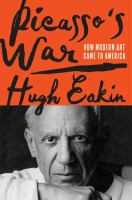 On April 12, we will turn to the world of international art. In January 1939, Pablo Picasso was renowned in Europe but disdained by many in the United States. One year later, Americans across the country were clamoring to see his art. How did the controversial leader of the Paris avant-garde break through to the heart of American culture?
On April 12, we will turn to the world of international art. In January 1939, Pablo Picasso was renowned in Europe but disdained by many in the United States. One year later, Americans across the country were clamoring to see his art. How did the controversial leader of the Paris avant-garde break through to the heart of American culture?
The answer begins a generation earlier, when a renegade Irish American lawyer named John Quinn set out to build the greatest collection of Picassos in existence. His dream of a museum to house them died with him, until it was rediscovered by Alfred H. Barr, Jr., a cultural visionary who, at the age of 27, became the director of New York’s new Museum of Modern Art.
Barr and Quinn’s shared goal would be thwarted in the years to come—by popular hostility, by the Depression, by Parisian intrigues, and by Picasso himself. It would take Hitler’s campaign against Jews and modern art, and Barr’s fraught alliance with Paul Rosenberg, Picasso’s persecuted art dealer, to get Picasso’s most important paintings out of Europe. Mounted in the shadow of war, the groundbreaking exhibition Picasso: Forty Years of His Art would launch Picasso in America, define MoMA as we know it, and shift the focus of the art world from Paris to New York.
Picasso’s War is the never-before-told story about how a single exhibition, a decade in the making, irrevocably changed American taste, and in doing so saved dozens of the twentieth century’s most enduring artworks from the Nazis. Through a deft combination of new scholarship and vivid storytelling, Hugh Eakin shows how two men and their obsession with Picasso changed the art world forever.
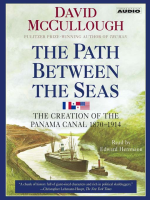 On March 8 at 1:30. we will discuss a first-rate drama of mobilization and diplomacy “not unlike that of war.” When fifteen years of struggle by Suez veteran Ferdinand de Lesseps to build a canal through the Panamanian isthmus collapsed through tropical disease, logistical barriers, and financial disgrace, two Americans managed literally superlative accomplishments: moving billions of cubic yards of dirt, harnessing one of the world’s most savage rivers, developing an unprecedented lock and electrical system, and, not least, defeating the Anopheles mosquito. In an open, vigorous style, author David McCullough contrasts the manic-depressive attitudes of French and American populations and leaders toward the canal with the cool perseverance of his two heroes: the engineer John Stevens, a former common laborer who took charge of the collapsing canal project and realized that the problem was not digging but transportation; and Dr. William Gorges, who conquered malaria and yellow fever in a region where hospital rooms used to literally shake from patients’ chills.
On March 8 at 1:30. we will discuss a first-rate drama of mobilization and diplomacy “not unlike that of war.” When fifteen years of struggle by Suez veteran Ferdinand de Lesseps to build a canal through the Panamanian isthmus collapsed through tropical disease, logistical barriers, and financial disgrace, two Americans managed literally superlative accomplishments: moving billions of cubic yards of dirt, harnessing one of the world’s most savage rivers, developing an unprecedented lock and electrical system, and, not least, defeating the Anopheles mosquito. In an open, vigorous style, author David McCullough contrasts the manic-depressive attitudes of French and American populations and leaders toward the canal with the cool perseverance of his two heroes: the engineer John Stevens, a former common laborer who took charge of the collapsing canal project and realized that the problem was not digging but transportation; and Dr. William Gorges, who conquered malaria and yellow fever in a region where hospital rooms used to literally shake from patients’ chills.
Ironically, it was the often jingoistic “Manifest Destiny” rhetoric and the medical experience of the brutal Spanish-American War that provided Congressional backing and scientific leads for the Panama task. A further twist was the origin of the Panamanian republic which permitted the canal to go through: French adventurer Phillippe Bunau-Varilla executed a coup against Colombia in 1903 for “the greater glory of France,” then, according to McCullough, promptly put the new nation and its treasury under the wardship of the U.S. State Department and the House of Morgan, respectively. Meanwhile, viewing the French example, Congress so feared possible graft in Panama that it threw horrific red tape around the canal project. But Stevens was able to recruit the greatest engineering minds of the period – and the book is able to recapture their breakthroughs.
 “Kissinger analyses the lives of six…leaders through the distinctive strategies of statecraft, which he believes they embodied. After the Second World War, Konrad Adenauer brought defeated and morally bankrupt Germany back into the community of nations by what Kissinger calls ‘the strategy of humility.’ Charles de Gaulle set France beside the victorious Allies and renewed its historic grandeur by ‘the strategy of will.’ During the Cold War, Richard Nixon gave geostrategic advantage to the United States by ‘the strategy of equilibrium.’ After twenty-five years of conflict, Anwar Sadat brought a vision of peace to the Middle East by a ‘strategy of transcendence.’ Against the odds, Lee Kuan Yew created a powerhouse city-state, Singapore, by ‘the strategy of excellence.’ And, though Britain was known as ‘the sick man of Europe’ when Margaret Thatcher came to power, she renewed her country’s morale and international position by ‘the strategy of conviction.'” —
“Kissinger analyses the lives of six…leaders through the distinctive strategies of statecraft, which he believes they embodied. After the Second World War, Konrad Adenauer brought defeated and morally bankrupt Germany back into the community of nations by what Kissinger calls ‘the strategy of humility.’ Charles de Gaulle set France beside the victorious Allies and renewed its historic grandeur by ‘the strategy of will.’ During the Cold War, Richard Nixon gave geostrategic advantage to the United States by ‘the strategy of equilibrium.’ After twenty-five years of conflict, Anwar Sadat brought a vision of peace to the Middle East by a ‘strategy of transcendence.’ Against the odds, Lee Kuan Yew created a powerhouse city-state, Singapore, by ‘the strategy of excellence.’ And, though Britain was known as ‘the sick man of Europe’ when Margaret Thatcher came to power, she renewed her country’s morale and international position by ‘the strategy of conviction.'” —
 McKinsey & Company is the most prestigious consulting company in the world, earning billions of dollars in fees from major corporations and governments who turn to it to maximize their profits and enhance efficiency. McKinsey’s vaunted statement of values asserts that its role is to make the world a better place, and its reputation for excellence and discretion attracts top talent from universities around the world. But what does it actually do?
McKinsey & Company is the most prestigious consulting company in the world, earning billions of dollars in fees from major corporations and governments who turn to it to maximize their profits and enhance efficiency. McKinsey’s vaunted statement of values asserts that its role is to make the world a better place, and its reputation for excellence and discretion attracts top talent from universities around the world. But what does it actually do?
In When McKinsey Comes to Town, two prizewinning investigative journalists have written a portrait of the company sharply at odds with its public image. Often McKinsey’s advice boils down to major cost-cutting, including layoffs and maintenance reductions, to drive up short-term profits, thereby boosting a company’s stock price and the wealth of its executives who hire it, at the expense of workers and safety measures. McKinsey collects millions of dollars advising government agencies that also regulate McKinsey’s corporate clients. And the firm frequently advises competitors in the same industries, but denies that this presents any conflict of interest.
In one telling example, McKinsey advised a Chinese engineering company allied with the communist government which constructed artificial islands, now used as staging grounds for the Chinese Navy—while at the same time taking tens of millions of dollars from the Pentagon, whose chief aim is to counter Chinese aggression.
Shielded by NDAs, McKinsey has escaped public scrutiny despite its role in advising tobacco and vaping companies, purveyors of opioids, repressive governments, and oil companies. McKinsey helped insurance companies’ boost their profits by making it incredibly difficult for accident victims to get payments; worked its U.S. government contacts to let Wall Street firms evade scrutiny; enabled corruption in developing countries such as South Africa; undermined health-care programs in states across the country. And much more.
Bogdanich and Forsythe have penetrated the veil of secrecy surrounding McKinsey by conducting hundreds of interviews, obtaining tens of thousands of revelatory documents, and following rule #1 of investigative reporting: Follow the money.
When McKinsey Comes to Town is a landmark work of investigative reporting that amounts to a devastating portrait of a firm whose work has often made the world more unequal, more corrupt, and more dangerous.
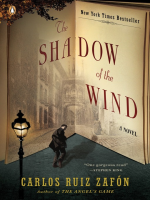 The New York Times bestseller“The Shadow of the Wind is ultimately a love letter to literature, intended for readers as passionate about storytelling as its young hero.” —Entertainment Weekly (Editor’s Choice)“One gorgeous read.” —Stephen King
The New York Times bestseller“The Shadow of the Wind is ultimately a love letter to literature, intended for readers as passionate about storytelling as its young hero.” —Entertainment Weekly (Editor’s Choice)“One gorgeous read.” —Stephen King
Barcelona, 1945: A city slowly heals in the aftermath of the Spanish Civil War, and Daniel, an antiquarian book dealer’s son who mourns the loss of his mother, finds solace in a mysterious book entitled The Shadow of the Wind, by one Julián Carax. But when he sets out to find the author’s other works, he makes a shocking discovery: someone has been systematically destroying every copy of every book Carax has written. In fact, Daniel may have the last of Carax’s books in existence. Soon Daniel’s seemingly innocent quest opens a door into one of Barcelona’s darkest secrets—an epic story of murder, madness, and doomed love.
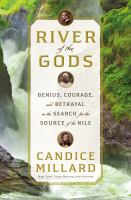 NEW YORK TIMES BESTSELLER • The harrowing story of one of the great feats of exploration of all time and its complicated legacy—from the New York Times bestselling author of The River of Doubt and Destiny of the Republic
NEW YORK TIMES BESTSELLER • The harrowing story of one of the great feats of exploration of all time and its complicated legacy—from the New York Times bestselling author of The River of Doubt and Destiny of the Republic
For millennia the location of the Nile River’s headwaters was shrouded in mystery. In the 19th century, there was a frenzy of interest in ancient Egypt. At the same time, European powers sent off waves of explorations intended to map the unknown corners of the globe – and extend their colonial empires.
Richard Burton and John Hanning Speke were sent by the Royal Geographical Society to claim the prize for England. Burton spoke twenty-nine languages, and was a decorated soldier. He was also mercurial, subtle, and an iconoclastic atheist. Speke was a young aristocrat and Army officer determined to make his mark, passionate about hunting, Burton’s opposite in temperament and beliefs.
From the start the two men clashed. They would endure tremendous hardships, illness, and constant setbacks. Two years in, deep in the African interior, Burton became too sick to press on, but Speke did, and claimed he found the source in a great lake that he christened Lake Victoria. When they returned to England, Speke rushed to take credit, disparaging Burton. Burton disputed his claim, and Speke launched another expedition to Africa to prove it. The two became venomous enemies, with the public siding with the more charismatic Burton, to Speke’s great envy. The day before they were to publicly debate,Speke shot himself.
Yet there was a third man on both expeditions, his name obscured by imperial annals, whose exploits were even more extraordinary. This was Sidi Mubarak Bombay, who was enslaved and shipped from his home village in East Africa to India. When the man who purchased him died, he made his way into the local Sultan’s army, and eventually traveled back to Africa, where he used his resourcefulness, linguistic prowess and raw courage to forge a living as a guide. Without Bombay and men like him, who led, carried, and protected the expedition, neither Englishman would have come close to the headwaters of the Nile, or perhaps even survived.
In River of the Gods Candice Millard has written another peerless story of courage and adventure, set against the backdrop of the race to exploit Africa by the colonial powers.
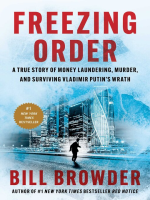 “Following his explosive New York Times bestseller Red Notice, Bill Browder returns with another gripping thriller chronicling how he became Vladimir Putin’s number one enemy by exposing Putin’s campaign to steal and launder hundreds of billions of dollars and kill anyone who stands in his way. When Bill Browder’s young Russian lawyer, Sergei Magnitsky, was beaten to death in a Moscow jail, Browder made it his life’s mission to go after his killers and make sure they faced justice. The first step of that mission was to uncover who was behind the $230 million tax refund scheme that Magnitsky was killed over. As Browder and his team tracked the money as it flowed out of Russia through the Baltics and Cyprus and on to Western Europe and the Americas, they were shocked to discover that Vladimir Putin himself was a beneficiary of the crime. As law enforcement agencies began freezing the money, Putin retaliated. He and his cronies set up honey traps, hired process servers to chase Browder through cities, murdered more of his Russian allies, and enlisted some of the top lawyers and politicians in America to bring him down. Putin will stop at nothing to protect his money. As Freezing Order reveals, it was Browder’s campaign to expose Putin’s corruption that prompted Russia’s intervention in the 2016 US presidential election. At once a financial caper, an international adventure, and a passionate plea for justice, Freezing Order is a stirring morality tale about how one man can take on one of the most ruthless villains in the world–and win”–
“Following his explosive New York Times bestseller Red Notice, Bill Browder returns with another gripping thriller chronicling how he became Vladimir Putin’s number one enemy by exposing Putin’s campaign to steal and launder hundreds of billions of dollars and kill anyone who stands in his way. When Bill Browder’s young Russian lawyer, Sergei Magnitsky, was beaten to death in a Moscow jail, Browder made it his life’s mission to go after his killers and make sure they faced justice. The first step of that mission was to uncover who was behind the $230 million tax refund scheme that Magnitsky was killed over. As Browder and his team tracked the money as it flowed out of Russia through the Baltics and Cyprus and on to Western Europe and the Americas, they were shocked to discover that Vladimir Putin himself was a beneficiary of the crime. As law enforcement agencies began freezing the money, Putin retaliated. He and his cronies set up honey traps, hired process servers to chase Browder through cities, murdered more of his Russian allies, and enlisted some of the top lawyers and politicians in America to bring him down. Putin will stop at nothing to protect his money. As Freezing Order reveals, it was Browder’s campaign to expose Putin’s corruption that prompted Russia’s intervention in the 2016 US presidential election. At once a financial caper, an international adventure, and a passionate plea for justice, Freezing Order is a stirring morality tale about how one man can take on one of the most ruthless villains in the world–and win”–
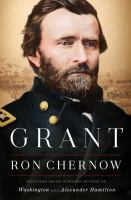 A massive biography of the Civil War general and president, who “was the single most important figure behind Reconstruction.”
A massive biography of the Civil War general and president, who “was the single most important figure behind Reconstruction.”
Most Americans know the traditional story of Ulysses S. Grant (1822-1885): a modest but brutal general who pummeled Robert E. Lee into submission and then became a bad president. Historians changed their minds a generation ago, and acclaimed historian Chernow (Washington: A Life, 2010, etc.), winner of both the National Book Award and the Pulitzer Prize, goes along in this doorstop of a biography, which is admiring, intensely detailed, and rarely dull. A middling West Point graduate, Grant performed well during the Mexican War but resigned his commission, enduring seven years of failure before getting lucky. At the outbreak of the Civil War, he was the only West Point graduate in the area, so local leaders gave him a command. Unlike other Union commanders, he was aggressive and unfazed by setbacks. His brilliant campaign at Vicksburg made him a national hero. Taking command of the Army of the Potomac, he forced Lee’s surrender, although it took a year. Easily elected in 1868, he was the only president who truly wanted Reconstruction to work. Despite achievements such as suppressing the Ku Klux Klan, he was fighting a losing battle. Historian Richard N. Current wrote, “by backing Radical Reconstruction as best he could, he made a greater effort to secure the constitutional rights of blacks than did any other President between Lincoln and Lyndon B. Johnson.” Recounting the dreary scandals that soiled his administration, Chernow emphasizes that Grant was disastrously lacking in cynicism. Loyal to friends and susceptible to shady characters, he was an easy mark, and he was fleeced regularly throughout his life. In this sympathetic biography, the author continues the revival of Grant’s reputation.
At nearly 1,000 pages, Chernow delivers a deeply researched, everything-you-ever-wanted-to-know biography, but few readers will regret the experience. For those seeking a shorter treatment, turn to Josiah Bunting’s Ulysses S. Grant (2004).
An excellent summary by Tom Igoe: DMA Book Club — Grant by Ron Chernow
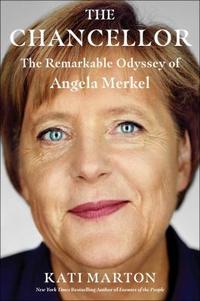 Kirkus Reviews: A glowing biography of the famously cautious yet effective chancellor of Germany.
Kirkus Reviews: A glowing biography of the famously cautious yet effective chancellor of Germany.
Marton, A Hungarian-born American foreign correspondent, clearly admires Angela Merkel (b. 1954), who has served as chancellor since 2005 and was hailed in a 2020 Pew Research poll as “the world’s most trusted leader, regardless of gender.” The author marvels especially at Merkel’s early years in East Germany, where her pastor father joined the call to serve the socialist East by moving his family from Hamburg to the rural hamlet of Templin, in the heart of the Soviet-occupied Democratic Republic of Germany. Indoctrinated in school, sealed off from the West by border walls in 1961, and spied on by her neighbors for the state security police, Merkel toed the line and kept a low profile while excelling at physics, first in Leipzig and then in East Berlin. With the fall of the Berlin Wall in 1989, she embraced a new profession: politics. When the East German DA party merged with the West German CDU, she became the mentee of the powerful Helmut Kohl. Working her way steadily up the ranks, Merkel ultimately assumed leadership of her party after Kohl left office. Unglamorous by choice, workmanlike to a fault, and used to sidestepping male egos, Merkel proved herself to be a deft civil servant and leader, especially in opening Germany’s borders to refugees in 2015 despite the backlash. “Her political rise,” writes Marton, “would be fueled by self-control, strategic thinking, and, when necessary, passive aggression.” Merkel’s determination to bolster Europe’s cohesion with French president Emmanuel Macron’s help and to strengthen ties between Europe and the U.S., despite opposition and/or apathy from the Trump administration, form her lasting legacy. Though the text is somewhat short on criticism, Marton clearly knows her subject and writes smoothly, pulling back the curtain on an enigmatic, significant world figure.
A human portrait more than a political one that amply captures the essence of a moral, determined leader.
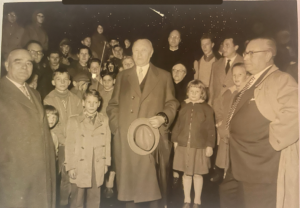 Thank you all for including me in such learned conversation! It shows your knowledge and your affinity to my Heimat (word is explained in the book), and I am truly moved!
Thank you all for including me in such learned conversation! It shows your knowledge and your affinity to my Heimat (word is explained in the book), and I am truly moved!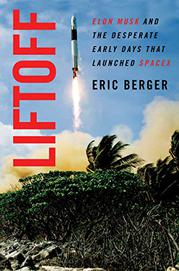 An up-close account of the otherworldly trajectory of tech magnate Elon Musk.
An up-close account of the otherworldly trajectory of tech magnate Elon Musk.
Ars Technica editor Berger opens with a telling scene set in South Texas in late September 2019, when Musk visited a factory building a rocket that one day will be bound for Mars. Sending that ship—and people—to the red planet is of a parcel with Musk’s pioneering work in “remaking the global aerospace industry,” which includes privatizing efforts that had long belonged to government agencies such as NASA—which, though funded to the tune of some $25 billion per year, still “remains several giant leaps away from sending a few astronauts to Mars.” Getting the SpaceX rocket safely to distant Mars “may not work,” Musk confessed before adding, “But it probably will.” By Berger’s swiftly moving account, it will, not just because Musk is an endlessly driven, intensely focused sort who could use a little more fun in life—at one point, Musk ruefully allows that “it wouldn’t have hurt to have just one cocktail on the damn beach” of a distant Pacific atoll used in test flights—but also because Musk is surrounded by brilliant scientists recruited from academia and industry who are thoroughly invested in the project’s success. “They want that golden ticket for the world’s greatest thrill ride,” Berger writes, evoking another obsessed genius, Willie Wonka. Musk now leads not just SpaceX, but also the Tesla electric automobile company as well as a neural technology company and a firm devoted to digging new transportation tunnels below overcrowded cities. Even so, he remains closely attentive to matters that aviation engineers have often overlooked, such as recycling rocket stages: “If an airline discarded a 747 jet after every transcontinental flight,” writes the author, “passengers would have to pay $1 million for a ticket.”
Readers interested in business and entrepreneurship, as well as outer space, will find Berger’s book irresistible.
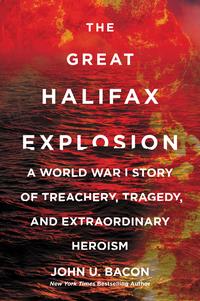 The Great Halifax Explosion : a World War I Story of Treachery, Tragedy, and Extraordinary Heroism
The Great Halifax Explosion : a World War I Story of Treachery, Tragedy, and Extraordinary Heroism
From the acclaimed New York Times bestselling author, a gripping narrative-nonfiction account of the world’s largest manmade explosion before the atomic bomb. In December 1917, a freighter carrying 3,000 tons of explosives sailed from Brooklyn bound for the trenches of World War I—en route, a cataclysmic disaster awaited . . .
Entering World War I’s fourth demoralizing year, the Allies hoped to break the grueling stalemate by sending thousands of fresh American troops and more munitions than ever to the trenches of France. Before the French freighter Mont-Blanc set sail from Brooklyn on December 1, 1917, with a staggering 3,000 tons of explosives, the captain banned his crew from lighting a single match, and secured the volatile cargo with copper nails because they don’t spark when struck.
For four harrowing days, the floating powder keg bobbed up the Eastern seaboard, plowing through a wicked snowstorm and waters infested with German U-Boats, which had already torpedoed a thousand Allied ships that year alone. On December 6, the exhausted crew finally slipped into Halifax Harbour—just as the relief ship Imo was rushing to leave. At 8:45 a.m., the Imo struck the Mont-Blanc’s bow, knocking over barrels of airplane fuel. Fire swept across the decks, sending the Mont-Blanc’s crew scurrying to their lifeboats, while Halifax longshoremen, office workers, and schoolchildren walked down to watch it burn.
At 9:04:35 a.m., the Mont-Blanc erupted, leveling 2.5 square miles of Halifax, killing 2,000 people, and wounding 9,000 more—all in one-fifteenth of a second.
In this definitive account, bestselling author John U. Bacon recreates the recklessness that caused the tragedy, the selfless rescue efforts that saved thousands, and the inspiring resilience that rebuilt the town. Just hours after the explosion, Boston alone sent 100 doctors, 300 nurses, and a million dollars. The explosion would revolutionize ophthalmology and pediatrics; transform Canada and the U.S. from adversaries to allies; and show J. Robert Oppenheimer, who studied Halifax closely, how much destruction an atomic bomb could inflict on a city.
Bacon brings to light one of the most dramatic events of the twentieth century, exploring the long shadow the world’s first “weapon of mass destruction” still casts on our world today.
